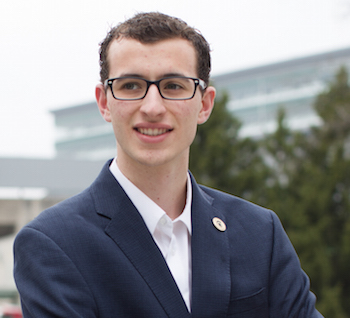
Lorenzo Santavicca
Now well into his second year as student body president of Michigan State University, Lorenzo Santavicca understands the realities of his school, one that has made headlines both for its athletics but also for its numerous reports of sexual misconduct. This year, he’ll be well-equipped to deal with some of these realities, stocked with resources from a new initiative by USC Shoah Foundation.
The senior, who studies international relations and political economy, attended in June the National Campus Leadership Council’s Presidential Leadership Summit in Washington, D.C., the largest gathering of student body presidents in the country. That’s where he first heard about the Institute
“We heard a presentation about what USC Shoah Foundation was doing, collecting stories from survivors of the Holocaust and other genocides, and how it’s trying to transfer some of those skills to campus leaders,” Santavicca said. “That piqued my interest.”
At the conference, USC Shoah Foundation Director of Programs and Operations Kori Street gave a keynote presentation about the different forms of hate that can happen on campuses, from LGBTQ discrimination to antisemitism, and about fostering inclusivity and preventing hate on college campuses. She also introduced a new program for student leaders called the Intercollegiate Diversity Congress.
The Intercollegiate Diversity Congress (IDC) Summit, to be held Oct. 13-14, 2017, on the USC campus, will convene student leaders from higher education campuses across the United States to support their efforts in building inclusive connected communities. USC Shoah Foundation will provide resources and training for the student leaders to be able to convene groups of students, staff and faculty to explore and engage in dialogue around campus climate issues.
One of the resources that will be available to students like Santavicca is an IWitness toolkit activity called Reflections and Action on Campus Diversity, designed for student leadership councils to address various kinds of discrimination and prejudice, and to decide how to take action on campus to foster acceptance and celebration of differences
“What’s really inspired me most is how the Institute understands how challenging it is today that we are so connected digitally and online, but so disconnected in person,” Santavicca said. “For me, it’s been particularly interesting seeing a generation that wants to be so connected. Hearing the presentation at the summit was extremely engaging because it was students reaching out to other students to create a new narrative, this storytelling initiative.”
Santavicca says missions like USC Shoah Foundation’s line up with the types of initiatives he’s tried to get started at his university, to better acquaint students with one another through storytelling, and thus breed understanding and tolerance.
“Last year, we kicked off an initiative within our own student government called ‘Stories Behind the Spartans [the university’s mascot],” Santavicca said. “It was an effort to ask students what inspired them to apply to the university and to enroll in classes, to have them tell their stories. And we spent time figuring out how to collect stories from our Spartans and suggest that other students listen, take to heart and really get to know their fellow peers.”
Santavicca embraces USC Shoah Foundation’s emphasis on storytelling as a means of empowering individuals, and said he hopes to bring back to his campus tools with which to facilitate dialogue around campus climate issues.
“I think one of the biggest challenges that we face, alongside every other campus, are challenges in respect and showing integrity toward other individuals,” Santavicca said. “I think that spans the areas of sexual assault, relationship violence and the conversation around mental health. Particularly in these arenas, storytelling can inspire others to seek help.”
During the Summit, Santavicca hopes to engage with other campus leaders, both to learn from what they’re doing and to make an influence.
“I like to think that you have a place to be a leader and a learner,” Santavicca said. “I want to be both at the same time at this conference and really listen to what other campuses are saying about these polarizing times. I think it’s going to be about how we have a responsibility to elevate marginalized and minority voices on our campuses as an example for society, and at the same time we have to recognize that everyone has a right to be on our campus and has a place here. Everyone is entitled to that.”
He also hopes to change dialogues off campus as well:
“We have a lot to do, to show other an example of how conversation can improve those areas, how conversations can really lead to change,” Santavicca said. “That’s what I really hope this conference will help me do.”